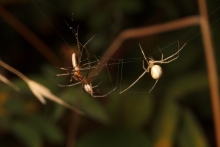A new discovery about the structure of melanin has brought scientists one step closer to developing a new, potentially ultra-protective sunscreen derived from a biological substance found in nearly all organisms. Researchers from McGill’s Department of Chemistry, in collaboration with The Ohio State University and the University of Girona, have announced a major advance in understanding the fundamental structure of melanin and one of its components that turns light into heat, protecting the body from sun damage.


Black anglophones in Quebec experience more discrimination and report more barriers to mental healthcare – and overall lower mental health – than their French-speaking counterparts, according to a new study from McGill University researchers in the Department of Psychology.

First study of humans with a rare immunodeficiency reveals how the immune system protects the body against pathogens known to cause serious diseases, such as tuberculosis and COVID-19. The research involving McGill University, paves the way for new therapies to treat autoimmune diseases, chronic inflammatory diseases, and new approaches to vaccine development.

The first research report from STOPMTL.ca, a participatory mapping project of police stop experiences, presents preliminary data contributed by citizens of Montreal.

The Honourable François-Philippe Champagne, Minister of Innovation, Science and Industry, announced $1.4 billion in support of 11 large-scale research initiatives through the Canada First Research Excellence Fund (CFREF) today at Concordia University in Montreal. The CFREF grants are awarded through a highly competitive process to the top programs in their fields.

Astronomers from McGill University are part of an international team that has discovered 25 new sources of repeating fast radio bursts (FRBs), these explosions in the sky that come from far beyond the Milky Way. This discovery brings the total number of confirmed FRB sources to 50.

McGill University has achieved the performance targets set out in its Socially Responsible Investing (SRI) strategy, a full two years ahead of schedule. This milestone is highlighted in the 2022 Investment Committee Report on Socially Responsible Investing, presented yesterday to the McGill Board of Governors. This is the third annual report since the Board of Governors approved the five-year, eight-point implementation plan for decarbonizing the University’s endowment portfolio in April 2020.

Despite extensive research and encouraging findings, Alzheimer’s disease (AD) remains difficult to diagnose based on signs and symptoms alone. But what if one day, a blood sample during an annual check-up could be used to identify the disease? A recent McGill-led study has found that a new kind of blood test is as effective at detecting AD as lumbar punctures, one of the current methods used to diagnose AD.

McGill University and the Université du Québec à Montréal (UQAM) announced today the creation of the Research and Innovation Chair in Animal Welfare and Artificial Intelligence (WELL-E). The five-year, $5 million Chair will carry out a major research project funded by a grant from NSERC Alliance and PROMPT, fiduciary of the Ministry of Economy, Innovation and Energy. Important contributions have also been made by industrial partners Novalait, Dairy Farmers of Canada (DFC), Dairy Farmers of Ontario (DFO), Les Producteurs de Lait du Québec (PLQ), and Lactanet.


Nurses exposed to 40 minutes of bright light before their night shifts feel less fatigued and make fewer errors at work, according to a study led by McGill University. The nurses also slept better after their shifts.

Thirty students from 10 countries will form the first global cohort of McCall MacBain Scholars at McGill University, arriving in September 2023.
Designed to encourage purposeful leadership, the scholarships are the result of a landmark $200 million gift in 2019 by John and Marcy McCall MacBain, the second-largest single donation in Canadian history.

Killer whales (also known as orcas) are intelligent predators. While it’s known that killer whales in the Pacific Northwest exploit widely different food types, even within the same region, we know much less about the feeding habits of those found throughout the North Atlantic. Thanks to a new technique developed by a research team led by McGill University, it is now possible to quantify, for the first time, the proportion of different prey that killer whales in the North Atlantic are eating by studying the fatty acid patterns in their blubber.

An array of 350 radio telescopes in the Karoo desert of South Africa is getting closer to detecting the “cosmic dawn” — the era after the Big Bang when stars first ignited and galaxies began to bloom.
A team of scientists from across North America, Europe, and South Africa has doubled the sensitivity of a radio telescope called the Hydrogen Epoch of Reionization Array (HERA). With this breakthrough, they hope to peer into the secrets of the early universe.

Teens in North America are spending several hours per day on screens, and there’s growing concern over how social media may affect their mental health.
